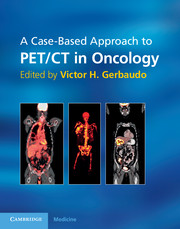Book contents
- Frontmatter
- Contents
- Contributors
- Foreword
- Preface
- Part I General concepts of PET and PET/CT imaging
- Part II Oncologic applications
- Chapter 5 Brain
- Chapter 6 Head, neck, and thyroid
- Chapter 7 Lung and pleura
- Chapter 8 Esophagus
- Chapter 9 Gastrointestinal tract
- Chapter 10 Pancreas and liver
- Chapter 11 Breast
- Chapter 12 Cervix, uterus, and ovary
- Chapter 13 Lymphoma
- Chapter 14 Melanoma
- Chapter 15 Bone
- Chapter 16 Pediatric oncology
- Chapter 17 Malignancy of unknown origin
- Chapter 18 Sarcoma
- Chapter 19 Methodological aspects of therapeutic response evaluation with FDG-PET
- Chapter 20 FDG-PET/CT-guided interventional procedures in oncologic diagnosis
- Index
- References
Chapter 17 - Malignancy of unknown origin
from Part II - Oncologic applications
Published online by Cambridge University Press: 05 September 2012
- Frontmatter
- Contents
- Contributors
- Foreword
- Preface
- Part I General concepts of PET and PET/CT imaging
- Part II Oncologic applications
- Chapter 5 Brain
- Chapter 6 Head, neck, and thyroid
- Chapter 7 Lung and pleura
- Chapter 8 Esophagus
- Chapter 9 Gastrointestinal tract
- Chapter 10 Pancreas and liver
- Chapter 11 Breast
- Chapter 12 Cervix, uterus, and ovary
- Chapter 13 Lymphoma
- Chapter 14 Melanoma
- Chapter 15 Bone
- Chapter 16 Pediatric oncology
- Chapter 17 Malignancy of unknown origin
- Chapter 18 Sarcoma
- Chapter 19 Methodological aspects of therapeutic response evaluation with FDG-PET
- Chapter 20 FDG-PET/CT-guided interventional procedures in oncologic diagnosis
- Index
- References
Summary
Introduction
Malignancy of unknown origin, also referred to as occult primary or cancer with unknown primary (CUP), presents a diagnostic and therapeutic challenge. Approximately 10–15% of patients present with metastatic disease without an obvious primary tumor, and in many cases a primary tumor is not found even at autopsy (1). These include the paraneoplastic syndromes, where a patient presents with the humoral effects of an occult primary. In the absence of a known primary tissue of origin, the therapy is empiric and the outcome is generally poor. However, there are several favorable presentations that should be considered, and there are advances in personalized therapy that may improve outcomes. The role of FDG-PET/CT in cancer with an unknown primary is still being defined, but it is likely to play an increased role not only in the initial evaluation of these patients, but also in the assessment of response and in the direction of subsequent therapy.
Patients with an occult primary frequently present with general symptoms such as anorexia, weight loss, and fatigue, or with a localizing finding, such as lymphadenopathy, pathologic fracture, or a large fluid collection. The tumors in these patients are heterogeneous in histological appearance, but are characterized by their aggressiveness, propensity for early dissemination, and atypical metastatic pattern. The existence of metastatic disease at presentation is associated with a poor prognosis, and with a median survival of less than a year (2, 3). However, patients with only loco-regional disease have a better prognosis (4).
Information
- Type
- Chapter
- Information
- A Case-Based Approach to PET/CT in Oncology , pp. 445 - 465Publisher: Cambridge University PressPrint publication year: 2012
